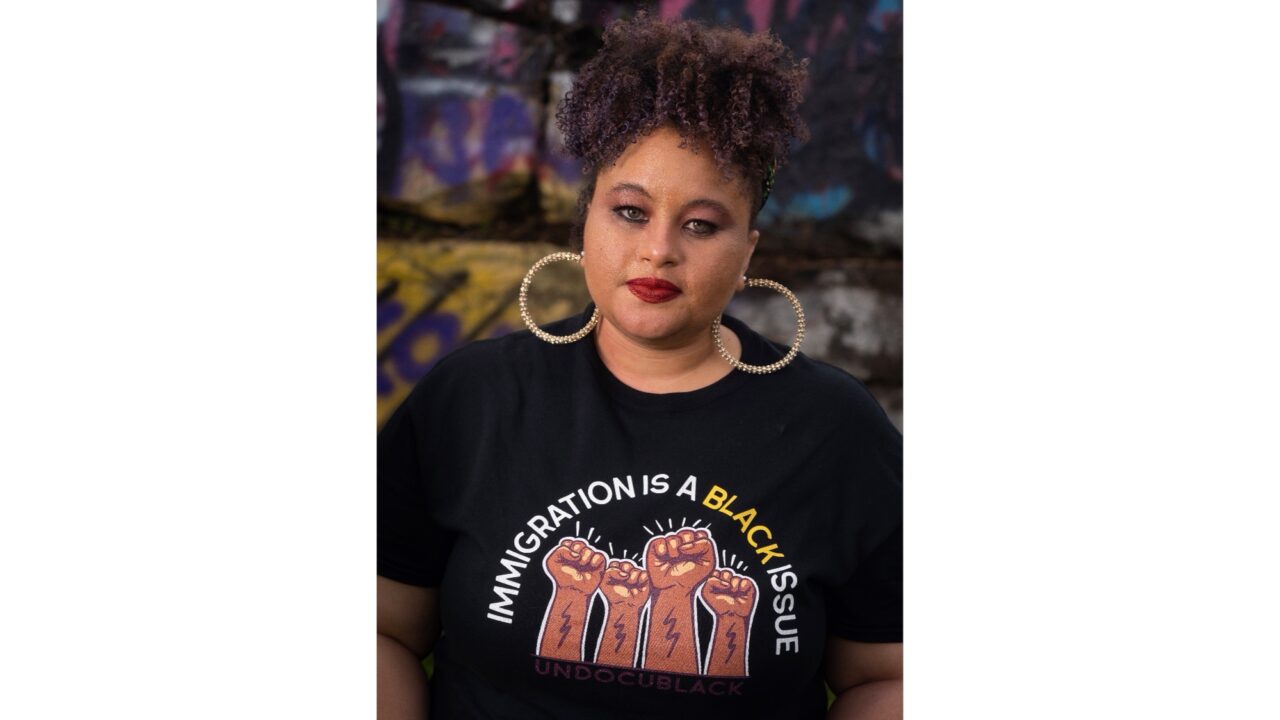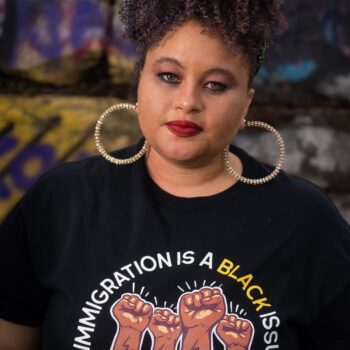Patrice Lawrence is the co-director of UndocuBlack, a multi-generation national network of currently and formerly undocumented Black people working to ensure that Black immigrants live freely and thrive. Lawrence sat down with Cristina Jimenez, co-fouder of United We Dream, to talk about her experiences as an undocumented Black woman and her work organizing the Black immigrant communities at the center of racist attacks from the Trump administration, the importance of healing justice and radical collaboration, and how she balances the day-to-day demands of organizing work with the imperative of building a sustainable movement that can deliver transformational change.
How did you become involved in this work?
In 2016, I went to the Undocumented and Black Convening. Folks were feeling and needing a space for Black undocumented people to be together. I remember being in a lunch line and turning to people around me and asking, “What’s your status?” I was finding my voice. I was speaking with a Jamaican accent, and I wasn’t afraid to do it. And it was the first time I had really told so many other people that I was undocumented.
It was amazing just seeing all of that — almost seventy folks who were all in similar situations. I saw people who were making it and were okay being their true selves. I saw people who were thriving. I started to believe that there was hope for me too. I began this work because I found a place where I could be myself. I found purpose. I want other people to feel that too and to give them whatever it is that they need to thrive.
What did you learn organizing in a community that was the center of the attacks of the Trump administration?
When the Trump administration started, I was living in the Midwest and starting to organize for UndocuBlack. We were all volunteers. We had started to organize for TPS [temporary protected status] folks and DACA folks because they were threatening to end that status. We had people in the organization who weren’t sure what their tomorrow was going to look like. They had all the fight in them. It was that drive that allowed me and others to believe we were going to get through it.
In the long-term we have to think about different buckets of work. First, we need to stay prepared to respond rapidly because attacks are just coming and coming and coming.
Second, we need to be able to replenish. We’ve talked a lot at UndocuBlack about revolutionary rest. We went off for the whole election week. We decided not to engage after Election Day because we knew it was going to be chaotic. Instead, we used that time for replenishing and reflecting.
Third, we need to reflect on who we have fought for and who we have not done that good a job of fighting for. For example, when UndocuBlack began, we raised funds to help trans and queer folks. Five years later, part of our reflection is looking at how much those folks are still centered in our work today. What does it look like to center everyone who identifies as Black and undocumented? That includes older folks, younger folks, parent folks, folks with degrees, and folks without. It doesn’t matter your station in life.
How are you thinking about movement building in your organizing going forward?
In terms of movement building, we are intentional about who it is that we’re working and building with. What are their values? Where are they from? How do we work together? We want to work in coalition where we are in alignment towards a certain goal but also working in collaboration, which is different.
Collaboration is not just, you bring the milk, I bring the sugar, and somebody else brings the butter to make the cake. Collaboration is everyone having their hands in the mixing and making that cake. Someone suggests that we should make it a rainbow cake and brings the food coloring. Someone else says one layer should be strawberry cream, somebody else says vanilla, and somebody else will say chocolate. And by the time we’re done, we have a really good three-layered cake that we are proud of. Who doesn’t like a cake that is just so inviting when you look at it? And how sweet does it feel to say, “I had a part in making that product.” To me, that’s what collaboration looks like.
I was a nanny for several years, and I remember the joy on kids’ faces when they had a hand in making stuff together. I believe that children show us the way because when they’re little they are not messed up by the world. They tell us what they need. Humans need to feel involved. We need to feel loved. We need to feel that the product we are making bears our stamp and that we have a story to tell about it.
How have you balanced rapid response with the need to keep your eye on longer-term goals?
I pay attention to three things: wellness, mentors, and training. First, I am learning from the folks around me who push me. Gabrielle Jackson, the co-director of UndocuBlack, is a therapist and social worker by trade. We’ve talked a lot about doing the work at UndocuBlack through a mental wellness lens. What does healing justice truly mean? What does it look like in my own life?
Second, I have folks to mentor and coach me — older folks within the movement, older folks within our group. I listen to their stories and they help me build understanding. They call me and pray for me. I’m in it for a long time and a good time, not one or the other. If I’m going to make it long, then I have to be really grateful. I have to pause for moments of joy and then I have to keep pushing. But you cannot push alone.
Third, say yes to whatever training comes your way. I always look forward to trainings. I am always asking, where do I need to increase my knowledge? I do not know everything, and it’s okay that I don’t know everything. I try to identify what I’m actually good at, what I want to learn, and let go of what I’m not good at. I find someone else who is good at it and give them the tools they need.
What are some examples of how you integrate healing justice in your work?
We use a peer-to-peer engagement program called Ayanda Hand in Hand. You are paired with people who you call “cousins.” You talk about day-to-day stuff with someone experiencing the same thing. You take a break from what you are working on. I told folks things about my life I never told anyone.
We also have the Alive and Well manual that we fold into all of our trainings. The Alive and Well manual is never far away from me. There are activities that support healing justice you can use in any training — storytelling, policy, and advocacy training.
One of my favorite activities is “diaspora bingo.” One time we played it with a bunch of TPS holders from African countries, from Haiti and Liberians as well as Nepali folks. We had to find someone in the room who can tell you if it’s “curry chicken” or “chicken curry” and find someone in the room who knows how to dance bachata. These types of activities allow us to find joy, learn new things, and [do] peer engagement that leads to relationships later on. By the way, it’s curry chicken.
Over the past four years, what do you think has worked, what hasn’t worked, and what do we need to do to be effective in fighting for immigrant justice and racial justice under a Biden administration?
During the past four years, we all had a common enemy. There was no in-between. One of the difficulties when you have a more friendly administration is that if we push, we might find ourselves in that great in-between. We might lose friends. We might not win.
In the years ahead, we’re going to have to gut check ourselves by asking, “What is it that we believe?” At UndocuBlack, we believe that we are all due respect, dignity, freedom, and liberation. Then we must do a litmus test on the things that are being presented to us: “Is this thing in alignment with our beliefs? Is it going to achieve liberation for our folks?” If it’s not, then it’s okay to talk out against it. I think actually it’s our duty to talk out against it. It is our duty to say, “This ain’t it, fam.” And we cannot let fear dictate what we agree to.
What are your hopes and fears moving forward?
Change needs a lot of people to overcome the inertia. This past summer, a lot of things reached a boiling point. But for a lot of us this wasn’t the first time we felt rage. This wasn’t the first time we understood racism or white supremacy. But enough people were all angry at the same time and made a shared demand. That’s why Trump was booted out of office.
The Biden administration needs to be reminded of that at every single turn. Do not let them forget that the reason they have power is because of Black women and Black folks. He said it at the podium. Now we need to make him remember that the power that he has was given to him by people who have been suffering and oppressed for far too long. We must not let him turn his back on us.
We have to keep in mind that how America exists right now and the problems we face stem from what has been going on for hundreds of years. That was made clear by Dawn Wooten, the whistleblower, who let us know about the forced hysterectomies and other sterilizations that were being done on the bodies of immigrant people. People were so upset and, “Oh, my gosh, it’s terrible.” Yes, it is. And we have to remember that the founding of gynecology is based on experimentation on the bodies of enslaved Africans in the West.
These problems are deeply rooted in every facet of society and they have solutions on all levels as well. There are multi-pronged ways to go about attacking the problems that we have. We don’t have to only have federal solutions. You can create solutions at the local level, in your community and municipalities. The solutions don’t just lie in immigration changes either; they lie in every sector — education, health, restorative justice, nutrition, economics — and these changes will better us all if they are rooted in justice.


